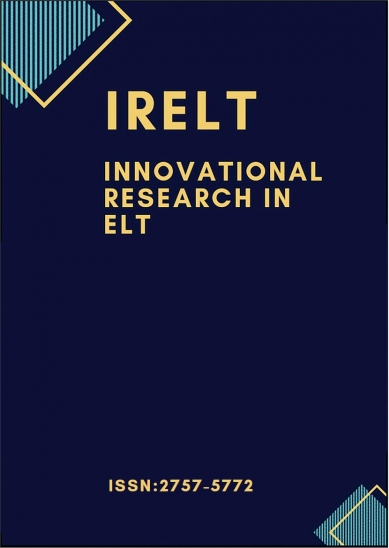Research article | Open Access
Innovational Research in ELT 2025, Vol. 6(1) 37-48
From Freshman to Senior: Tracking Motivation in English Learning among ELT Students
pp. 37 - 48 | DOI: https://doi.org/10.29329/irelt.2025.1314.4
Publish Date: June 27, 2025 | Single/Total View: 197/105 | Single/Total Download: 212/110
Abstract
This study investigates the differences in motivation towards English language learning among 1st, 2nd, 3rd, and 4th-year students in the English Language Teaching (ELT) program at a state university. The participants comprised 167 ELT students: 50 first-year students (41 females and 9 males), 50 second-year students (45 females and 5 males), 43 third-year students (35 females and 8 males), and 25 fourth-year students (17 females and 8 males). To examine the students’ integrative, instrumental, resultative, and intrinsic motivation, a questionnaire adapted from Tsai and Chang (2013) was administered. The findings indicate that students across all academic years exhibit resultative, instrumental, and intrinsic motivation. However, 1st and 2nd year students demonstrated lower levels of integrative motivation, while 3rd and 4th year students showed higher levels of integrative motivation. In terms of gender, no statistically significant differences were found between male and female participants. Nevertheless, female students displayed higher levels of resultative, instrumental, and intrinsic motivation, whereas male students exhibited higher levels of integrative motivation.
Keywords: Keywords: integrative motivation, instrumental motivation, resultative motivation, intrinsic motivation, grade, gender, academic progression.
APA 7th edition
Kocaman, O. (2025). From Freshman to Senior: Tracking Motivation in English Learning among ELT Students. Innovational Research in ELT, 6(1), 37-48. https://doi.org/10.29329/irelt.2025.1314.4
Harvard
Kocaman, O. (2025). From Freshman to Senior: Tracking Motivation in English Learning among ELT Students. Innovational Research in ELT, 6(1), pp. 37-48.
Chicago 16th edition
Kocaman, Orhan (2025). "From Freshman to Senior: Tracking Motivation in English Learning among ELT Students". Innovational Research in ELT 6 (1):37-48. https://doi.org/10.29329/irelt.2025.1314.4
Crystal, D. (2003). English as a global language (2nd ed.). Cambridge University Press.
Csizér, K., & Dörnyei, Z. (2005). The internal structure of language learning motivation and its relationship with language choice and learning effort. The Modern Language Journal, 89(1), 19–36. https://doi.org/10.1111/j.0026-7902.2005.00263.x
Dörnyei, Z. (2001). Motivational strategies in the language classroom. Cambridge University Press.
Ehrman, M. E., Leaver, B. L., & Oxford, R. L. (2003). A brief overview of individual differences in second language learning. System, 31(3), 313–330. https://doi.org/10.1016/S0346-251X(03)00045-9
Gardner, R. C. (2010). Integrative motivation and second language acquisition. Canadian Association of Applied Linguistics Joint Plenary Talk, London, Ontario.
Gardner, R. C., & Lambert, W. E. (1972). Attitudes and motivation in second-language learning. Newbury House.
Gardner, R. C., & Smythe, P. C. (1975). Second language acquisition: A social psychological approach (Research Bulletin No. 332).
Gürsoy, E. (2011). ELT teacher trainees’ attitudes towards English language as an indication of professional readiness. Paper presented at ICONTE – International Conference on New Trends in Education and Their Implications, Antalya, Turkey.
Hashwani, M. S. (2008). Students’ attitudes, motivation and anxiety towards English language learning. Journal of Research and Reflections in Education, 2(2), 121–144.
Hosseini, S. B., & Pourmandnia, D. (2013). Language learners’ attitudes and beliefs: Brief review of the related literature and framework. International Journal on New Trends in Education and Their Implications, 4(4), 6–14.
Karahan, F. (2007). Language attitudes of Turkish students towards the English language and its use in Turkish context. Çankaya University Journal of Arts and Sciences, 1(7), 73–87.
Keblawi, F. (2009). A review of language learning motivation theories. Jameea, 12, 23–57.
Khodadady, E., & Khajavy Fadafen, G. H. (2013). Exploring the role of anxiety and motivation in foreign language achievement: A structural equation modeling approach. Porta Linguarum, 20, 269–286.
Lamb, M. (2004). Integrative motivation in a globalizing world. System, 32(1), 3–19. https://doi.org/10.1016/j.system.2003.04.002
Lamb, M. (2012). A self system perspective on young adolescents’ motivation to learn English in urban and rural settings. Language Learning, 62(4), 997–1023. https://doi.org/10.1111/j.1467-9922.2012.00719.x
Lan, L. T. (2008). Factors affecting motivation in learning speaking English of grade 10 students at Yendinh 1 High School (Doctoral dissertation, University of Auckland).
Norris-Holt, J. (2001). Motivation as a contributing factor in second language acquisition. The Internet TESL Journal, 7(6), 1–8. http://iteslj.org/Articles/Norris-Motivation.html
Ramage, K. (1990). Motivational factors and persistence in foreign language study. Language learning, 40(2), 189-219.
Rudziński, P. (2009). The resultative hypothesis – Myth or reality? On motivation and success in the foreign language classroom. [Unpublished manuscript].
Samad, A. A., Etemadzadeh, A., & Far, H. R. (2012). Motivation and language proficiency: Instrumental and integrative aspects. Procedia – Social and Behavioral Sciences, 66, 432–440. https://doi.org/10.1016/j.sbspro.2012.11.287
Saracaloğlu, A. S., Varol, S. R., & Gencel, İ. E. (2014). Relationship between the level of foreign language learning and the cognitive and affective features of students of physical education and sports school. Eğitimde Kuram ve Uygulama, 10(4), 970–998.
Shehadeh, A., & Dwaik, R. (2010). The age factor in EFL learning: Insights from the Palestinian Early Start English Program. An-Najah University Journal for Research, 24(7), 2119–2149.
Soleimani, H., & Hanafi, S. (2013). Iranian medical students’ attitudes towards English language learning. International Research Journal of Applied and Basic Sciences, 4(12), 3816–3823.
Taguchi, T., Magid, M., & Papi, M. (2009). The L2 motivational self system among Japanese, Chinese and Iranian learners of English: A comparative study. In Z. Dörnyei & E. Ushioda (Eds.), Motivation, language identity and the L2 self (pp. 66–97). Multilingual Matters.
Tsai, C., & Chang, I. (2013). The study of motivation and anxiety of English learning of students
at a Taiwan technical university. International Journal of English Language Teaching, 1(1), 24–
41.
Ushioda, E. (2011). Language learning motivation, self and identity: Current theoretical
perspectives. Computer Assisted Language Learning, 24(3), 199–210.
https://doi.org/10.1080/09588221.2010.538701
Waseem, F., & Jibeen, T. (2013). Anxiety amongst learners of English as a second language: An examination of motivational patterns in the Pakistani context. International Journal of Humanities and Social Sciences, 3(16), 174–184.
Zanghar, A. (2012). Instrumental and integrative motivation among undergraduate Libyan students of English as a foreign language (Doctoral dissertation, Colorado State University).
